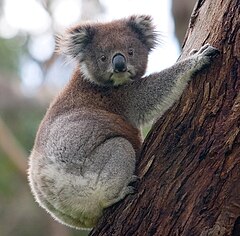Our website is made possible by displaying online advertisements to our visitors.
Please consider supporting us by disabling your ad blocker.
Koala
| Koala Temporal range: Middle Pleistocene – Recent
| |
|---|---|

| |
| Scientific classification | |
| Domain: | Eukaryota |
| Kingdom: | Animalia |
| Phylum: | Chordata |
| Class: | Mammalia |
| Infraclass: | Marsupialia |
| Order: | Diprotodontia |
| Family: | Phascolarctidae |
| Genus: | Phascolarctos |
| Species: | P. cinereus
|
| Binomial name | |
| Phascolarctos cinereus (Goldfuss, 1817)
| |

| |
| Koala range
Native
Introduced
| |
| Synonyms[2]: 45 [3] | |
The koala (Phascolarctos cinereus), sometimes inaccurately called the koala bear, is an arboreal herbivorous marsupial native to Australia. It is the only extant representative of the family Phascolarctidae. Its closest living relatives are the wombats. The koala is found in coastal areas of the island's eastern and southern regions, inhabiting Queensland, New South Wales, Victoria, and South Australia. It is easily recognisable by its stout, tailless body and large head with round, fluffy ears and large, dark nose. The koala has a body length of 60–85 cm (24–33 in) and weighs 4–15 kg (8.8–33.1 lb). Fur colour ranges from silver grey to chocolate brown. Koalas from the northern populations are typically smaller and lighter in colour than their counterparts further south. These populations are possibly separate subspecies, but not all researchers accept this.
Koalas typically inhabit open Eucalyptus woodland, as the leaves of these trees make up most of their diet. This eucalypt diet has low nutritional and caloric content and contains toxic compounds that deter most other mammals from feeding on it. Koalas are largely sedentary and sleep up to twenty hours a day. They are asocial, only mothers bond to dependent offspring. Adult males communicate with bellows that intimidate rivals and attract mates. Males mark their presence with secretions from scent glands located on their chests. Like other marsupials, koalas give birth to young known as joeys at a very early stage of development. They crawl into their mothers' pouches, where they live for their first six to seven months. They are fully weaned around a year old. Koalas have few natural predators and parasites, but are threatened by pathogens such as Chlamydiaceae bacteria and koala retrovirus.
Because of their distinctive appearance, koalas, along with kangaroos and emus, are recognised worldwide as symbols of Australia. They were hunted by Indigenous Australians and depicted in myths and cave art for millennia. The first recorded encounter between a European and a koala was in 1798, and an image of the animal was published in 1810 by naturalist George Perry. Botanist Robert Brown wrote the first detailed scientific description in 1814, although his work remained unpublished for 180 years. Artist John Gould illustrated and described the koala, introducing the species to the British public. Further details about the animal's biology were revealed in the 19th century by English scientists. Koalas are listed as a vulnerable species by the International Union for Conservation of Nature. Among the many threats to their existence are habitat destruction caused by agriculture, urbanisation, droughts, and associated bushfires, some related to climate change. In February 2022, the koala was officially listed as endangered in the Australian Capital Territory, New South Wales, and Queensland.
- ^ Woinarski, J.; Burbidge, A.A. (2020). "Phascolarctos cinereus". IUCN Red List of Threatened Species. 2020: e.T16892A166496779. doi:10.2305/IUCN.UK.2020-1.RLTS.T16892A166496779.en. Retrieved 12 November 2021.
- ^ Cite error: The named reference
moyalwas invoked but never defined (see the help page). - ^ Groves, C. P. (2005). "Order Diprotodontia". In Wilson, D. E.; Reeder, D. M (eds.). Mammal Species of the World: A Taxonomic and Geographic Reference (3rd ed.). Johns Hopkins University Press. p. 43. ISBN 978-0-8018-8221-0. OCLC 62265494.
Previous Page Next Page



